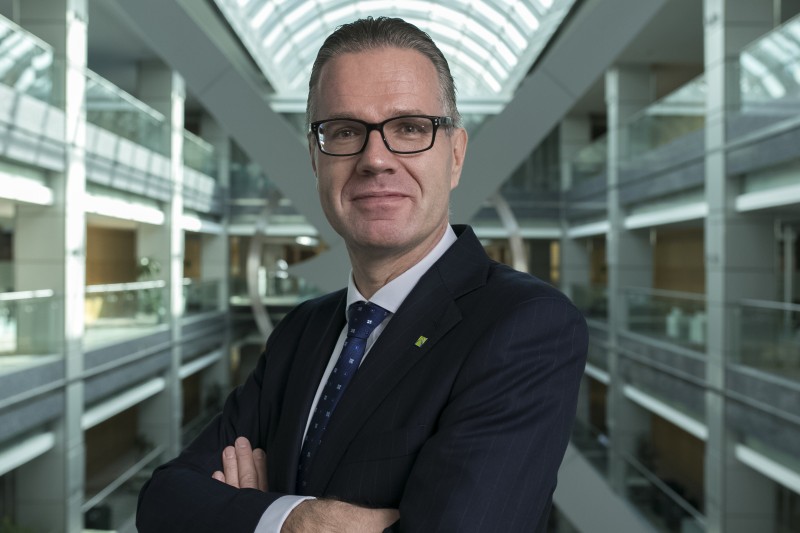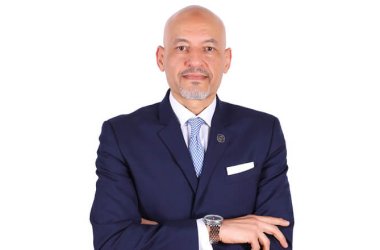
The banking industry in the GCC will not promote senior executives who fear or are ignorant of technology, says Commercial Bank of Dubai CEO Dr Bernd van Linder.
Dutchman van Linder is extremely conscious of the responsibility that he must bear if CBD is to succeed in the digital age, and believes that having a tech-minded CEO is just as important as possessing a business-minded CIO. “No c-suite executive can get away with saying ‘I don’t like or understand technology,’” he says. “That’s not sustainable. In this day and age, and particularly in a data-intensive industry like banking, the CEO and the c-suite have to understand technology. The flipside of that is that the CIO has to have a deep enough understanding of the business to be a credible conversation partner for the c-suite. We’re lucky at CBD that we’re covered in both respects.”
Taking the Commercial Bank of Dubai hotseat in January 2017, Dr Bernd van Linder is sure to draw envious eyes from across an industry – and region – where the pace of technological change has gathered serious momentum over the last 18 months. Banking, perhaps more so than any other industry, is under pressure to put all of its services at customers’ fingertips.
While debate rages on as to which responsibilities for digitalising an organisation lie where, having a CEO – the figure with whom the buck always stops – with proven technology credentials is sure to offer a substantial head start.
After completing a Master’s course in computer science in his formative years, van Linder’s thirst for technological knowledge compelled him to continue his studies before venturing into the world of work. He opted to undertake a PhD in artificial intelligence at the University of Utrecht in the Netherlands, and to this day, the course of study continually proves to be a shrewd move. “It has definitely helped me a lot in my subsequent career,” he says. “It’s been particularly useful in terms of problem analysis and structuring solutions to problems, as well as concise writing and reporting.”
Although van Linder acknowledges that technology has evolved “significantly” since he left university, the fundamental principles that underpinned his studies have endured. “I think it took about 20 years for AI to become fashionable again after I’d finished my thesis,” he quips. As global technology giants have laid their bets with investments in smart machines, van Linder believes that AI will become a staple of business, but remains a topic that is, for many, cloaked in mystery. “AI has become the buzzword of 2018,” he says. “I’m not sure if too many people understand what it means, but’s definitely not a question of hype. Fundamentally, I don’t think attitudes towards AI have changed too much, especially in terms of the researchers I knew at university. The main principals were there when I studied.”
Van Linder believes that the substance behind this evolution is Moore’s Law, and that humanity has reached a point where a once-futuristic fantasy now sits on our doorsteps. “When I did my thesis, there were two schools of thought,” he says. “One tried to model AI based on human intelligence. The other said that we should keep throwing more computing power at things, and if we keep doing that then we’ll get deep neural networks, which results in something that looks like intelligence. I belonged to the first school of thought, and with hindsight that was clearly wrong. The one that focused on massive computer power has won, and there is massive added value coming out of that. Whether that can actually be classed as ‘intelligence’ is more of a philosophical debate, but in terms of decision support, and analysing massive amounts of unstructured data, there is clearly great added value in AI as we currently see it.”
The key challenge for van Linder, and CBD, is to opt for technology that can deliver value, instead of vanity. As a number of banks across the region have opted for eye-catching technology launches, van Linder is in no doubt where the biggest gains can be made. “The main area of added value is the digitisation of all end-to-end processes,” he says. “Anybody can build an app, and there are all kinds of frameworks in place – apps to build apps. Digitising end-to-end processes – taking out paperwork and human intervention, making sure things are straight-through, seamless, error-free – that’s where the biggest challenge is. It’s also where the biggest opportunity is. That’s not a fad. That will reduce operating costs for banks, and substantially improve the experience for the customer.”
After just under a year in the role, van Linder has already begun to initiate a measure of technology change at CBD. Looking forward, he has grand plans for the firm, and has laid out a transformational roadmap that will be driven by technology, but will not abandon the human touch. “CBD will be a different bank in five years’ time,” he says. “It will be default-digital for retail and corporate clients, and will offer a seamless, fast, error-free experience. It will still have a substantial number of branches because there will be human interaction required in various ways. Branches will be much more focused on the service element rather than the sales element. We may have less branches in future, but there will always be a role for them. All operational tasks will be transferred to electronic channels or will have been centralised, so it will be a fundamentally different bank.”
Van Linder – and CBD’s pledge to put to put technology first is not all talk. In 2016, CBD became the first bank in the Middle East to launch a purely digital offering for tech-savvy millennials, and van Linder takes the move as a key point of pride. “CBD now is doing very well,” he says. He is also adamant that CBD’s future offerings will depend on the principle of a consistent technology experience across devices. “It’s clear that that every bank – all of the banks in the UAE seem to have followed our approach as well – needs to focus on having a seamless, multi-channel proposition for its clients. It’s not just a digital proposition, but an offering across channels. You want to give clients a true multi-channel experience. I should be able to start opening an account over the app, and finish it in the branch or through a call centre. Today, I don’t think too many banks are there, but that should be the end state.”
Having previously worked as managing director for Saudi Hollandi Bank in the Kingdom, van Linder continues to keep an eagle-eyed watch over the banking industry in the Netherlands, inevitably drawing comparisons between the industry’s technology offerings in Europe and the Middle East. What he’s seen in the GCC has particularly impressed him. “In some ways, the Middle East is way ahead of Europe,” he says. “If you look at functionality that is provided through ATMs, that’s clear. ATMs here allow you to do all kinds of things, like pay utility bills, subscribe to IPOs and remit money. That kind of functionality is not available in Europe.”
He also believes that the Middle East’s banking industry has been in-tune with a region that is known for its love of mobile applications and devices. “I think from a technology perspective, the apps that banks in the Middle East provide are very good,” he says. “Not just CBD Now, but other banks in the UAE and Saudi. I don’t think there’s much catching up to do compared to Europe. Younger banks have the advantage of having an easier job of digitising their back-end, and I believe that’s the main focus for every bank in the world today.”
One such technology that is currently at its peak of hype is Blockchain. The transparency offered by the distributed ledger-based service has led many to claim that it will transform not only technology and finance, but business at large, with some lauding it as being as influential as the Internet was in the 1990s. “There will be certain areas where it will fundamentally change the world,” van Linder says. “I wouldn’t be surprised if all the exchanges as we know them today will be run as a Blockchain platform in the near future, but there will be certain areas where existing infrastructures will perform better for some time to come. It’ll have a big impact in areas of documentation and things like settlement, compliance and know-your-customer-related requirements. The challenge will be real-time performance when you talk about massive scale payments.”
Fintech is another area where van Linder sees an opportunity for innovation, but remains reserved on what the industry’s rise actually signifies. “The challenge on the Fintech side for banks is digitising processes,” he says. “There’s not a lot that startups are offering there, and is simply hard work that the bank, its operations, IT and business departments have to do. There’s great added value coming from Fintech, and we keep our eyes and ears open to all the developments that happen, but the bulk of the hard work will have to be done by the banks themselves.”





